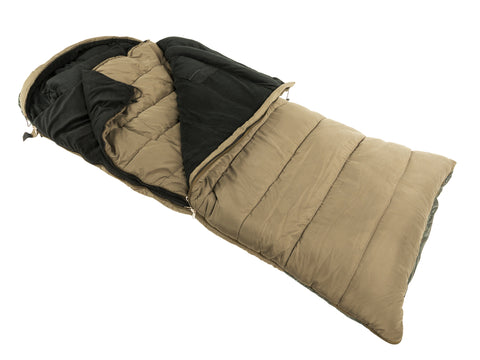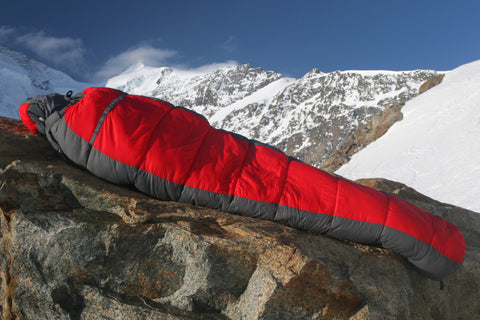Sleeping bags are often used by campers and hikers as a form of portable bedding. They are typically inserted into a larger sleeping bag cover, which provides warmth and protection from the elements. But can you suffocate in a sleeping bag? Sleeping bags are not airtight, so it is impossible to suffocate in one. However, if the sleeping bag is not properly ventilated, it can cause carbon dioxide to build up, which can lead to headaches, dizziness, and nausea. To avoid this, make sure to open the sleeping bag's vents or unzip it partially before going to sleep.
The Dangers of Sleeping in an Unventilated Sleeping Bag
If you’re planning on spending a night outdoors, it’s important to be aware of the dangers of sleeping in an unventilated sleeping bag.
While it might seem like a good way to stay warm, you could actually be suffocating yourself. Sleeping in an unventilated sleeping bag can cause carbon dioxide to build up around your head and body. This can lead to dizziness, headaches, and even unconsciousness. In extreme cases, it can be fatal. To avoid this, always make sure your sleeping bag is properly ventilated. If you’re using a tent, open the door or window to allow fresh air in. You can also prop open the top of your sleeping bag.

The Risks of Carbon Dioxide Poisoning
Almost everyone has spent a night outside under the stars in warm winter tent and sleeping bag at some point in their lives.
But did you know that there is a risk of carbon dioxide poisoning when sleeping in a bag?
Carbon dioxide is an odorless and colorless gas that is produced when we breathe. When we are outdoors, the wind dissipates the gas quickly.
However, when we are in a confined space like a sleeping bag, the gas can build up and cause poisoning. The symptoms of carbon dioxide poisoning include headache, dizziness, nausea, and shortness of breath. If you experience any of these symptoms while sleeping in a bag, you should get out of the bag immediately and get fresh air.
The Dangers of Hypothermia
Have you ever wondered if you can suffocate in a sleeping bag? The answer is yes, it is possible to suffocate in a sleeping bag if you are not careful. Sleeping bags can be very dangerous if you are not using them correctly. One of the dangers of sleeping in a sleeping bag is hypothermia. Hypothermia is when your body temperature drops below 95 degrees Fahrenheit. When your body temperature drops, your body starts to shut down. You may feel cold, your skin may turn blue, and you may start to shiver. If you do not get help, hypothermia can be fatal. If you are camping in cold weather, it is important to be aware of the risks of hypothermia.
Conclusion
Sleeping bags are common camping and hiking accessory, but did you know that you can actually suffocate in one? It's true! If you sleep in a sleeping bag without ventilation, the carbon dioxide that you exhale can build up and cause you to suffocate.
So, how can you prevent this from happening? Make sure to ventilate your sleeping bag by opening it up or unzipping it at the top. Also, avoid sleeping in a sleeping bag on a soft surface, like a mattress, where the fabric can block the flow of air. By following these simple tips, you can stay safe and suffocation-free while enjoying a good night's sleep.
FAQ
Is it possible to suffocate in a sleeping bag?
Many people have questions about whether it is possible to suffocate in a sleeping bag.
The answer is yes, it is possible to suffocate in a sleeping bag if the bag is not properly ventilated.
Sleeping bags can trap body heat and moisture, which can lead to suffocation. It is important to make sure that your sleeping bag is properly ventilated to avoid this danger.
Is it better to sleep with clothes on or off in a sleeping bag?
There are a few factors to consider when deciding whether it is better to sleep with clothes on or off in a sleeping bag. One is the temperature. If it is cold outside, you will want to keep your clothes on to stay warm. Another factor is if you are using a sleeping bag liner. A liner will add an extra layer of warmth, so you may be able to sleep without clothes if you are using one. The final factor to consider is personal preference. Some people just feel more comfortable sleeping with clothes on. Ultimately, it is up to you to decide what is best for you.

Can a dog suffocate in a sleeping bag?
Dogs are typically very active creatures, but they can also sleep up to 18 hours a day.
When they do sleep, they often curl up in a tight ball. This natural instinct to curl up tight can be dangerous if your dog is sleeping in a sleeping bag.
If the sleeping bag is not big enough for your dog to move around in, it can easily suffocate.
Why do you sleep naked in a sleeping bag?
There are a few reasons why you might want to consider sleeping naked in a sleeping bag. For one, it can help keep you cool. Sleeping with less clothing can help regulate your body temperature, which is important when you’re trying to get a good night’s rest. Additionally, it can help you feel more comfortable. When you’re not worrying about your clothes, you can relax and focus on getting the rest you need. Finally, it can be a fun way to spice up your camping or sleepover experience!
ABOUT THE AUTHOR
Olivia Poglianich
Content Strategist
Olivia Poglianich is a nomadic brand strategist and copywriter in the ski and snowboard space who has worked with brands such as Visa, Disney and Grey Goose. Her writing has taken her all over the world, from a Serbian music festival to a Malaysian art and culture event. Olivia is a graduate of Cornell University and is often writing or reading about travel, hospitality, the start-up ecosystem or career coaching. Her latest interests are at the intersection of web3 and communal living, both on and offline.






